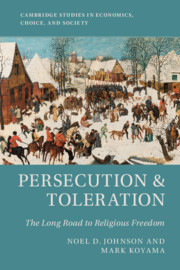Book contents
- Frontmatter
- Contents
- List of Figures
- List of Tables
- Preface
- Acknowledgments
- 1 Toleration, Persecution, and State Capacity
- I Conditional Toleration
- II The Origins Of Religious Freedom
- 7 State Building and the Reformation
- 8 The Inquisition and the Establishment of Religious Homogeneity in Spain
- 9 From Confessionalization to Toleration and Then to Religious Liberty
- 10 From Persecution to Emancipation
- III Implications Of Greater Religious Liberty
- Bibliography
- Index
10 - From Persecution to Emancipation
from II - The Origins Of Religious Freedom
Published online by Cambridge University Press: 18 February 2019
- Frontmatter
- Contents
- List of Figures
- List of Tables
- Preface
- Acknowledgments
- 1 Toleration, Persecution, and State Capacity
- I Conditional Toleration
- II The Origins Of Religious Freedom
- 7 State Building and the Reformation
- 8 The Inquisition and the Establishment of Religious Homogeneity in Spain
- 9 From Confessionalization to Toleration and Then to Religious Liberty
- 10 From Persecution to Emancipation
- III Implications Of Greater Religious Liberty
- Bibliography
- Index
Summary
The corporate political character of the medieval European Jewish community ceased to exist. Rabbis were no longer civil magistrates with police powers. Instead, they exercised authority only among those they could persuade to obey.
Ellenson (1994, xii)The treatment of Jews in medieval and early modern Europe has provided a case study with which to examine the conditional toleration equilibrium under a finer microscope. This has provided an in-depth portrait into how important religion was and how European states governed on the basis of discriminatory and restrictive identity rules. In this chapter we study how at the end of the eighteenth century states across Western Europe began to dismantle these rules.
First, we examine the reasons for the decline in persecutions and violence against Jews. Though expulsions, riots, and pogroms still took place, the number of acts of violence against Jews markedly diminished after 1600. We review evidence that the rise of state capacity that took place during this period played a crucial role in extending protection to Jewish communities.
Second, we study the legislative changes, collectively known as Jewish emancipation, that transformed the status of Jews across Western and Central Europe, bringing them legal equality. Inspired by mercantilistic concerns, rulers in the Habsburg empire and Germany slowly freed Jews from many of the restrictions that governed their existence during the medieval period. The French Revolution and the armies of Napoleon then spread emancipation across Europe. These shocks swept away much of what remained of the conditional toleration equilibrium and set the stage for the emergence of economic and political liberalism in the second half of the nineteenth century.
Expulsions remained in the repertoire of European rulers. Jews were expelled from Vienna in 1669/70, Munich in 1715, and Stuttgart in 1731. Over 12,000 Protestants were expelled from Salzburg in 1731. As late as 1744Maria Theresa (r. 1740–1780), ruler of the Habsburg empire, expelled the Jews of Prague. But this was one of the last such occurrences and, other rulers, including George II of England, pleaded with her to retract the order.2 Though legal and social discrimination remained in place across continental Europe, violence against Jews declined after 1600.What factors can account for this decline?
- Type
- Chapter
- Information
- Persecution and TolerationThe Long Road to Religious Freedom, pp. 184 - 200Publisher: Cambridge University PressPrint publication year: 2019

